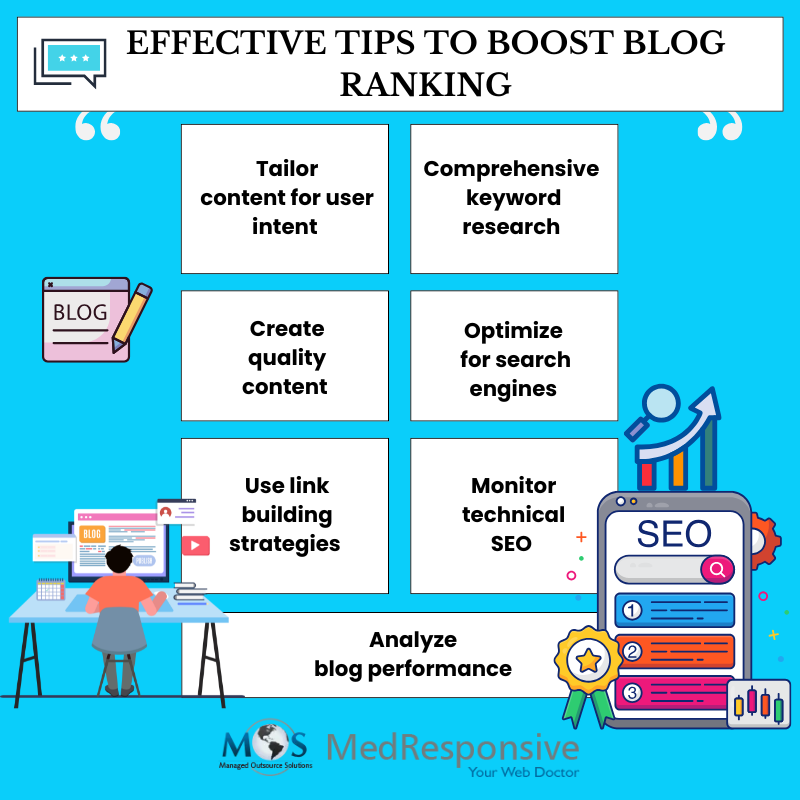The search engine results page is a crowded digital platform where thousands of blogs vie for user attention and top ranks to drive website traffic and business growth. Despite the best efforts, even brilliantly crafted blog posts often struggle to gain attention. To dominate search results, you need to master the skill and knowledge required for creating user-readable, SEO-friendly blog posts. Search engines such as Google consider several ranking factors to sift through billions of web pages and decide the ranking of websites. As executing a blog SEO strategy is a long-term commitment, partnering with a search engine optimization company is a practical way to optimize your blog for improved traffic, ranking, and leads.
Understanding Blog SEO
Blog SEO is the practice of applying SEO techniques to individual blog posts for gaining online visibility. Search engines such as Google are one of the largest sources of website traffic, with Google dominating the traffic-referring domain with 63.41% of referrals. Microsoft and Bing combined together are at second place, contributing about 7.21% of referrals. These statistics reveal the importance of optimizing blogs for SEO to attract the vast amount of website traffic available to your website. Investing in blog SEO offers several benefits for your business, such as:
- Improve brand exposure and online visibility
- Boost website organic traffic
- Generate organic leads
- Drive more sales
Strategies to Improve Blog SEO
- Tailor content for user intent – One of the first steps in managing your blog’s SEO is to understand who you are writing for and why. By recognizing the target audience for your blog, you can easily find out their pain points and use that knowledge to offer helpful content to meet their needs. The blog content should match with the user intent to create impact and resonate with your audience.
This tailored content is not just for attracting the ideal users but also for establishing your blog as an authoritative source on your niche to the search engines. When you create high-quality, valuable content, your blog posts are more likely to be shared by your audience. To achieve this goal, conduct comprehensive keyword research to uncover user intent and keyword ranking to build topic clusters for your blog.
- Comprehensive keyword research – To define the right audience, start with a comprehensive keyword research used in searches that are centered on your specific niche. The starting point for your keyword research can be identifying short, broad and popular keywords and their search volume. However, such keywords usually have high traffic and are extremely competitive, and will not provide the desired outcome. Instead, targeting long tail keywords for your blog posts are a strategic approach to increase the target audience reach.
When incorporating long tail keywords, focus on the phrases with decent traffic volume and less competition to rank higher and generate more leads. Position the keywords strategically throughout your blog page in page sections such as title, subheadings, opening and closing paragraph. Doing so enhances the discoverability of your blog by both search engines and users. Additionally, explore semantic keywords and include them to provide extra context and depth of your content. You can utilize various keyword research tools such as Google’s Keyword Planner, SEMrush or Ahrefs’ Keyword Explorer to obtain a list of keywords to target.
- Create quality content – Google’s algorithms prioritize user experience, so writing engaging, useful and high-quality content is an essential part of SEO strategy. Your blog posts should be unique, in-depth and well-researched, delivering new valuable information for your audience. The content of your blog should aim to solve user problems and offer actionable advice along with evidence to instill trust in your users. Use clear and concise language to entertain and inform the audience for better user engagement. The blog post should align with user search queries and your business goals and expertise to attract the targeted traffic. Google introduced 4 benchmarks to their Search Quality Evaluator Guidelines to assess the quality and credibility of the content to help search engines rank the websites. Google’s E-E-A-T acronym stands for:
- Experience
- Expertise
- Authoritativeness
- Trustworthiness
Publishing valuable content that adheres to search engine quality standards helps propel your website to the top of the SERP.
- Optimize for search engines – Well-structured, organized content is crucial to build a website optimized for search engines. This is referred to as on-page optimization. It involves implementing a series of best practices to optimize websites and improve search engine page ranking. Let’s explore few of the SEO tactics you can execute to optimize your website and boost ranking:
- Incorporate target keywords in relevant places such as titles, main header, and meta description
- Craft captivating title tags
- Structure content with header tags
- Write compelling meta titles and descriptions
- Removing thin and duplicate content
- Include rich, original multimedia elements optimized for SEO
- Enhance content readability with legible fonts, short paragraphs and bullet points
- Incorporate internal and external links
- Optimize for featured snippets
- Provide appropriate alt texts for images and filenames
By meticulously optimizing the above on-page SEO components, you can significantly enhance user experience and maximize organic traffic rate.
- Implement link-building strategies – A well thought-out link-building strategy is an established SEO practice to boost a site’s online visibility, brand authority and search engine rankings. There are different types of link building methods:
- Internal links –As you publish consistent blog posts, incorporate internal linking to connect related topics within your website. Doing so not only helps user navigation but also facilitates on-site engagement and reduces bounce rate. To maximize the potential of internal linking, identify the best performing and important web pages in your site such as contact page, high-converting blog posts or services page to cultivate internal links. Use descriptive anchor text and include relevant keywords in your internal links so search engines can index your site better.
- External links – An external link that leads users from one domain to another can be used to cite authoritative content or resources in your website. External linking is vital to substantiate your content’s credibility and authority to the search engines. You can use domains such as .gov or .edu to build reliable reference sites that add value to your content.
- Backlinks – Earning backlinks helps to establish your blog as a source of reputable and authoritative sites for search engines. Actionable approaches such as guest posting on other websites, collaborating with influential bloggers in your niche and engaging in social media platforms can help you acquire high-quality backlinks.
A successful link strategy can boost improve search results rankings and engagement with your blog post.
Also read:
The Most Common Link Building Mistakes
- Monitor technical SEO – When Google ranks your website, default preference is given to the mobile version of your site for indexing purposes. To improve your SEO, it is crucial to optimize your site usability across devices. Even if the desktop version of your website gains more traffic, it is important to optimize a responsive mobile version of your site for “mobile-first indexing.” To enhance the technical aspects of SEO, consider improving the following elements:
- Site speed
- Device compatibility
- Responsive web design
- Clean website architecture and URLs
- User-friendly navigation
- Secure browsing
- Accessibility
- Fix broken links
- Remove duplicate content
- Add structured data and schema markup
- Create robots.txt file
- Build XML and HTML sitemap
Monitor the above technical components of your blog for enhanced blog performance and website security.
- Analyze blog performance – Measuring the blog performance is imperative to gauge the progress and identify what efforts are working for your blog. Set blog objectives and goals before tracking your blog’s performance to see if they align with your SEO strategies. Maintaining a comprehensive report gives valuable insights about the current state of your blog and scale your blog SEO strategies accordingly. Devise continuous improvement processes in your blog SEO campaign to generate more leads and customer conversion rates. Use monitoring tools such as Google Analytics and Google Search Console to track KPIs, such as:
- Click-through rates
- Bounce rates
- Keyword ranking
- Total organic traffic
- Direct traffic
- Referral traffic
- Specific traffic per blog post
- Average session duration
- Return visitors
- Total conversion rate
By analyzing these KPIs, you can determine future SEO initiatives based on data-driven insights to optimize your blogs and achieve tangible outcomes.
In the evolving digital landscape, implementing right SEO strategies for your blog is paramount to open the door to increased online visibility, organic traffic and business growth. Investing in blog SEO is a continuous effort that requires data-driven decisions to drive market reach and business growth for any company. Partnering with an agency specializing in professional SEO services is a practical option for achieving your business goals.





